SLRC 22 Advanced Robotics Workshop: A Journey into the Realm of ROS
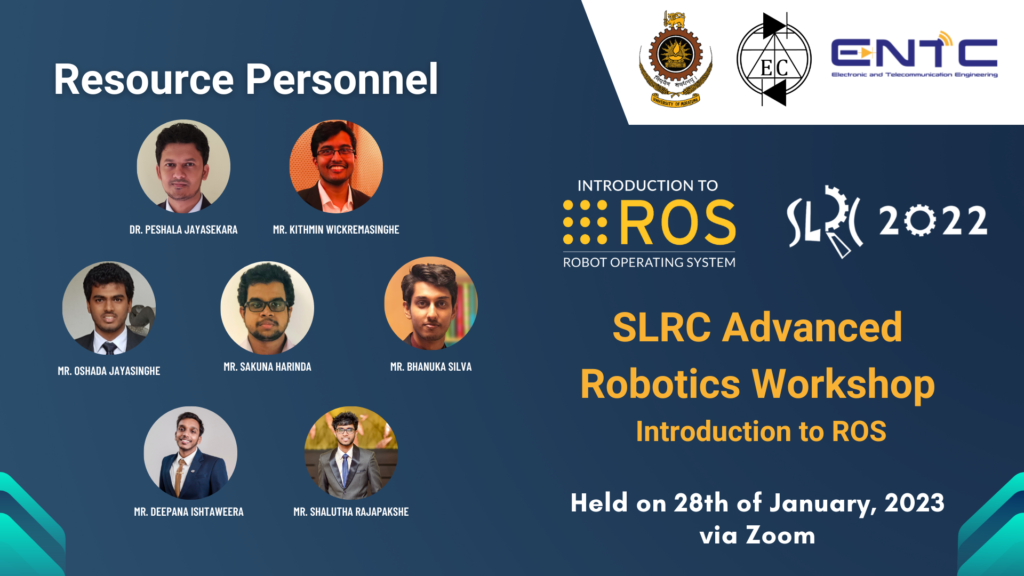
The Sri Lankan Robotics Challenge (SLRC) is an exciting place to promote robotics education and research in Sri Lanka. The SLRC branch of Electronic Club, Department of Electronic and Telecommunication Engineering (ENTC), University of Moratuwa (UoM) hosted a one-day online workshop titled “Introduction to Robot Operating System (ROS)” in conjunction with the SLRC 22/23 competition on January 28th, 2023. The workshop aimed at anyone who was interested in developing advanced robotic systems using ROS.
The instructor panel included fully competent resource personnels led by Dr. Peshala Jayasekara, a senior lecturer at ENTC, UoM, as well as few other ENTC graduates namely Mr.Kithmin Wickramasinghe, Mr. Bhanuka Silva, Mr Oshada Jayasinghe, Mr Sakuna Harinda , Mr Deepana Ishtaweera and Mr Shalutha Rajapaksha who extended their fullest support to make the event a success.
The program kicked off with an overview of the fundamentals of ROS, including its architecture, communication strategy, and message passing framework. Afterward, the participants were guided through creating a basic robot system in ROS utilizing its various tools and libraries. The participants were given access to a virtual environment to practice designing and developing robots with ROS. Robot sensors and actuators, robot control, and computer vision were just a few of the more complex topics that were covered in the program. The instructor panel also provided participants with tips and best practices for building robust and efficient robotic systems using ROS.
Throughout the day, participants were encouraged to ask questions and seek guidance from the instructors. This created a collaborative and supportive learning environment where participants could learn from each other’s experiences and insights. The workshop was attended by a 140+ diverse group of participants, including school students, undergraduates, and professionals from various industries from all over Sri Lanka and beyond.
At the end, the participants’ feedback was overwhelmingly positive, with many praising the workshop’s worth for their professional development and the caliber of the training. The SLRC received acclaim from participants for offering such a forum for free robotics study and networking with like-minded people.
Overall, the SLRC’s one-day online ROS program was a huge success, giving participants a firm grounding in both advanced robotics principles and ROS. The event served as an invaluable resource for anyone interested in using ROS to construct sophisticated robotic systems and demonstrated the SLRC’s dedication to promoting robotics in Sri Lanka.
Dulini Himeka
Read MoreNBQSA 2022 – National ICT Awards
The final year project titled “Road Sign, Traffic Light and Static Object Detection for Self-Driving” won the Student Research Project of the Year Award and the Bronze Award for Tertiary Students Projects (Technology) at the National ICT Awards – NBQSA 2022. The project has also been nominated to APICTA (Asia Pacific ICT Alliance) Awards 2022 which will be held in Islamabad, Pakistan from 7th to 11th December 2022.
The National Best Quality Software Awards (NBQSA), which is held by the British Computer Society for the past 24 years, provides recognition to outstanding achievements of individuals and organizations in Sri Lanka in the ICT domain. The Tertiary Students Projects (Technology) Award targets the best technical solutions proposed and implemented by undergraduates while the Student Research Project of the Year Award identifies the undergraduate project with the highest research impact.
The award winning project is focused on real time detection of traffic signs, traffic lights, lanes and road markings in a resource constrained environment. Three deep learning based detection frameworks have been developed to cater this requirement and the trained detection models have been optimized using TensorRT and integrated together to deploy as a complete static object detection system on an embedded system. In addition, two benchmark datasets have been created, one for traffic signs and traffic lights, and the other for road markings in the Sri Lankan domain. The research contributions of the project have been published as three papers in IEEE ICMLA 2021, IEEE/CVF WACV 2022 and IEEE IV Symposium 2022.
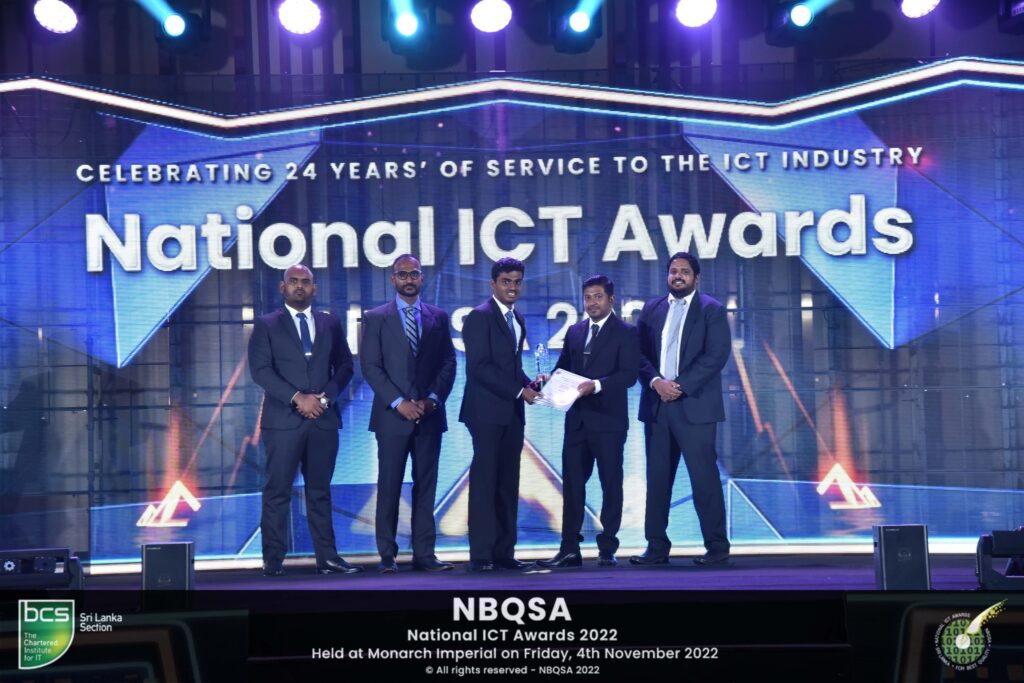
Six ENTC Graduates Join Harvard as Post Baccalaureate Research Fellows to Work on Computational Imaging and Computational Biology
Six students in the graduating class Jathurshan Pradeepkumar, Kithmini Herath, Mithunjha Anandakumar, Ramith Hettiarachchi, Udith Haputhanthri, and Hasindu Kariyawasam, joined Faculty of Arts and Sciences at Harvard University as Post Baccalaureate Research Fellows to Work on Computational Imaging and Computational Biology.
Under the computational imaging areas, they will be particularly working on a new microscopy design framework named, differentiable microscopy which is a new concept introduced by the Harvard laboratory, Wadduwage lab. Under computational biology, they will be working on problems related to protein folding and protein design with SoLab.
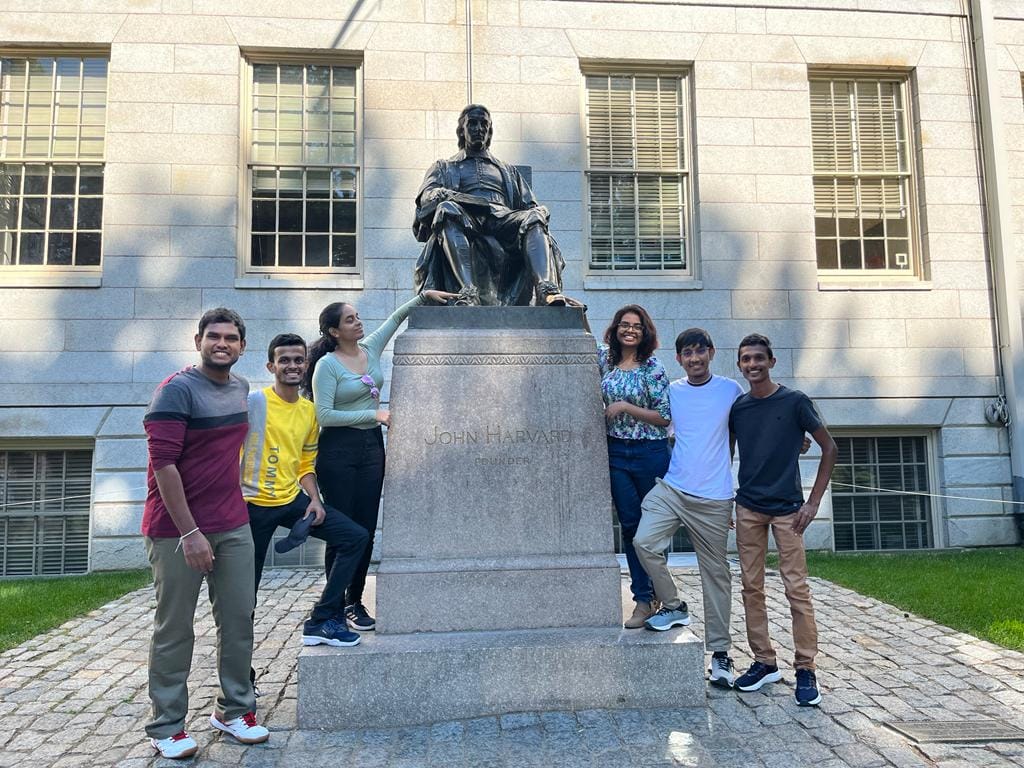
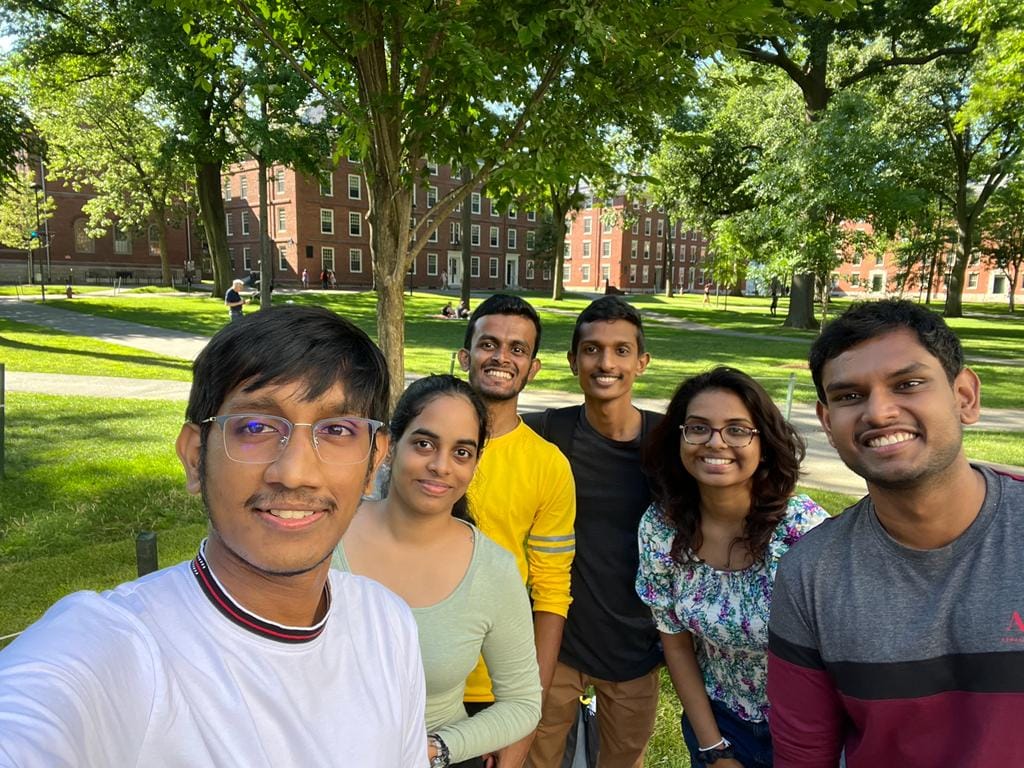
SPARK Award Ceremony and Launch
At the SPARK award ceremony and launch the three top teams that proposed engineering solutions to problems that affect the society addressing the Sustainable Development Goals (https://sdgs.un.org/goals) won awards and cash prizes. This was after a year-long process of ideation and prototype development by many teams. Ten teams reached the final pitching round held on July 24, 2022. An eminent panel of judges comprising Mr. Fayaz Hudah, Mr. Chalinda Abeykon and Mr. Josh Robsen made the selection of winners.
Supun Kuruppu, Chirantha Kurukulasooriya, Dumindu Bandara, and Biyon Fernando as Team Phantom won the grand prize, a trophy and a cash prize of Rs 600,000. As the coral population throughout the world is rapidly declining due to the prevailing climate crisis and toxic human activities, Team Phantom proposed to collect the coral gametes using a robot to subsequently provide proper conditions for growth. The proposed robot automates the current process which the scientists have to undergo diving and collecting the gametes by themselves.
First runners up, Team Axon, comprised Nuwan Bandara, Sahan Hettiarachchi, Kulunu Dayasekara, Dasun Premathilake. They proposed a system to monitor the depth of anesthesia to tailor the drug administration to the individual patient, thus preventing excessive anesthetic depth and improves patients’ outcome. Second runners up, Team Fix-It, comprising Sahan Viduranga, Isuru Munasinghe, Yomali Lokugama, and Vishawa Oshadha introduced a system that continuously checks the pollutant levels of water in rivers and reservoirs. The two teams won Rs 300,000 and Rs 100,000 respectively.
Following the award ceremony, the SAPRK project launched the 2022-2023 challenge that includes the students of the Intake 2020. The event took place on July 30, 2022, at the Civil Engineering Auditorium. Mr. Heminda Jayaweera delivered the keynote address. The award ceremony and launch were educational, and exiting for all the participants.
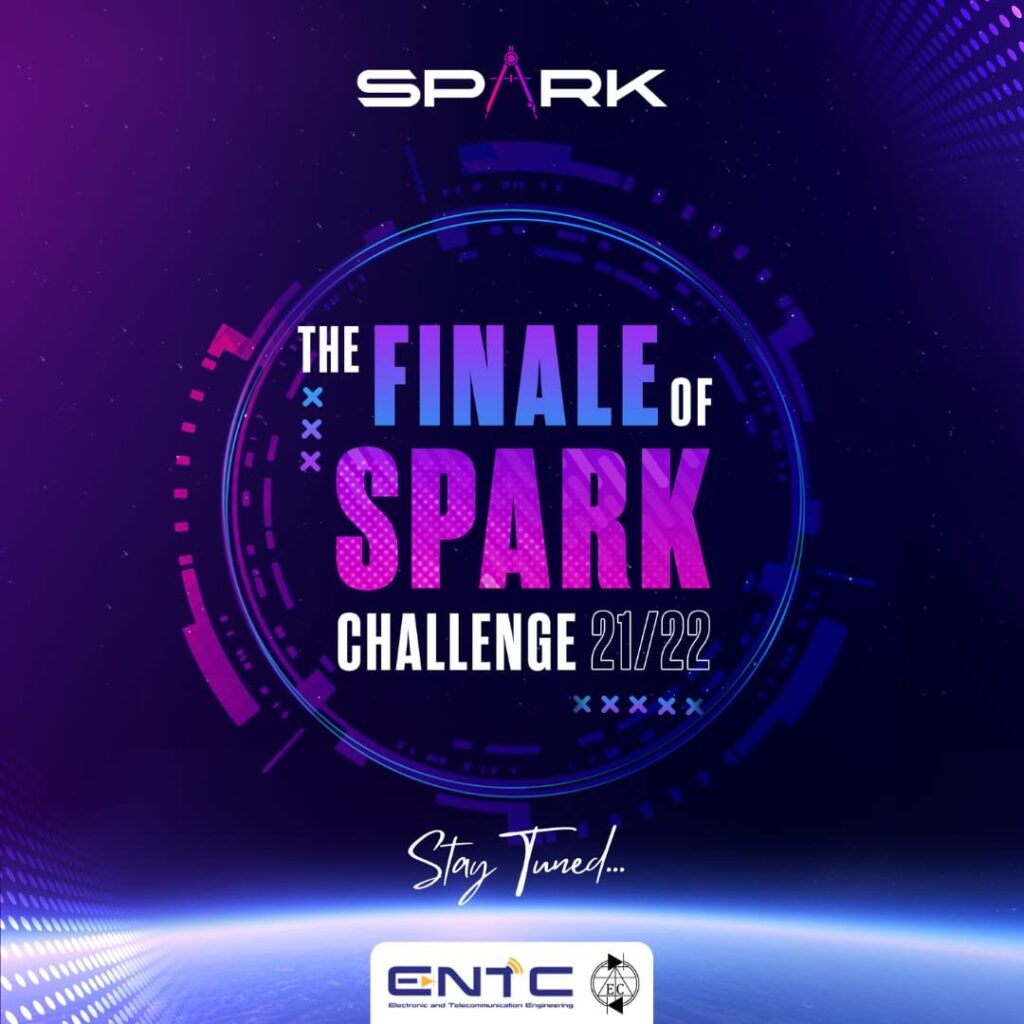
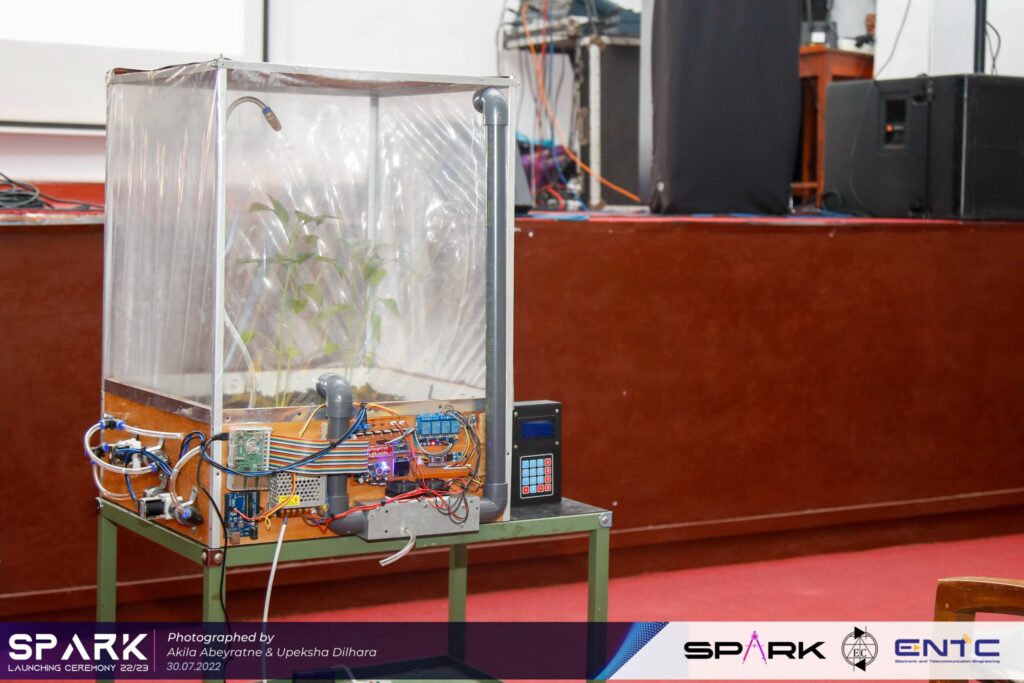
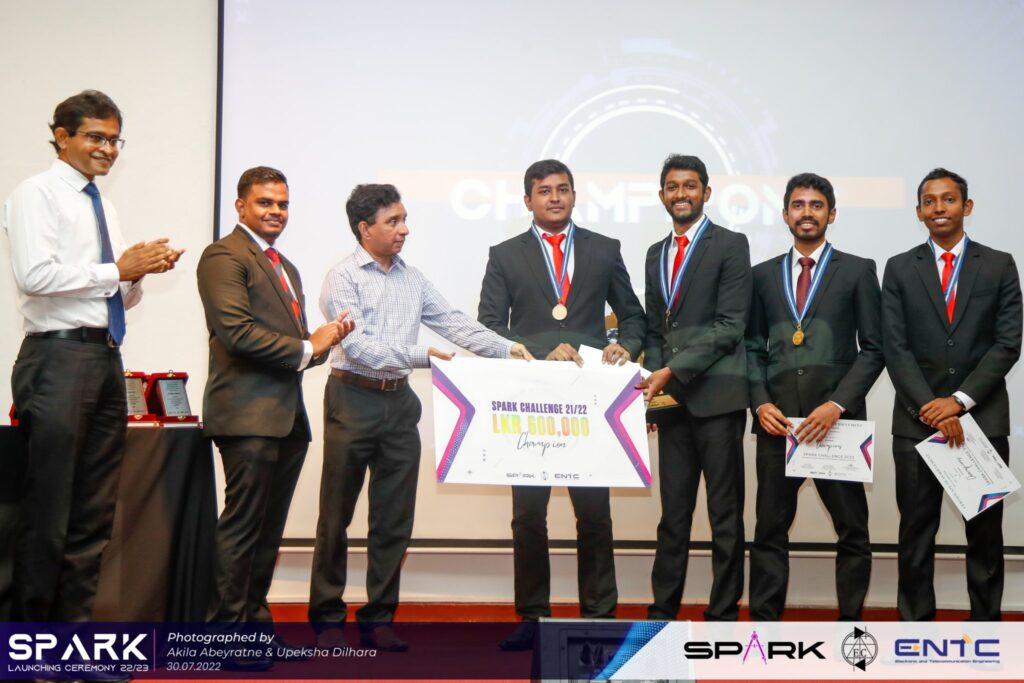
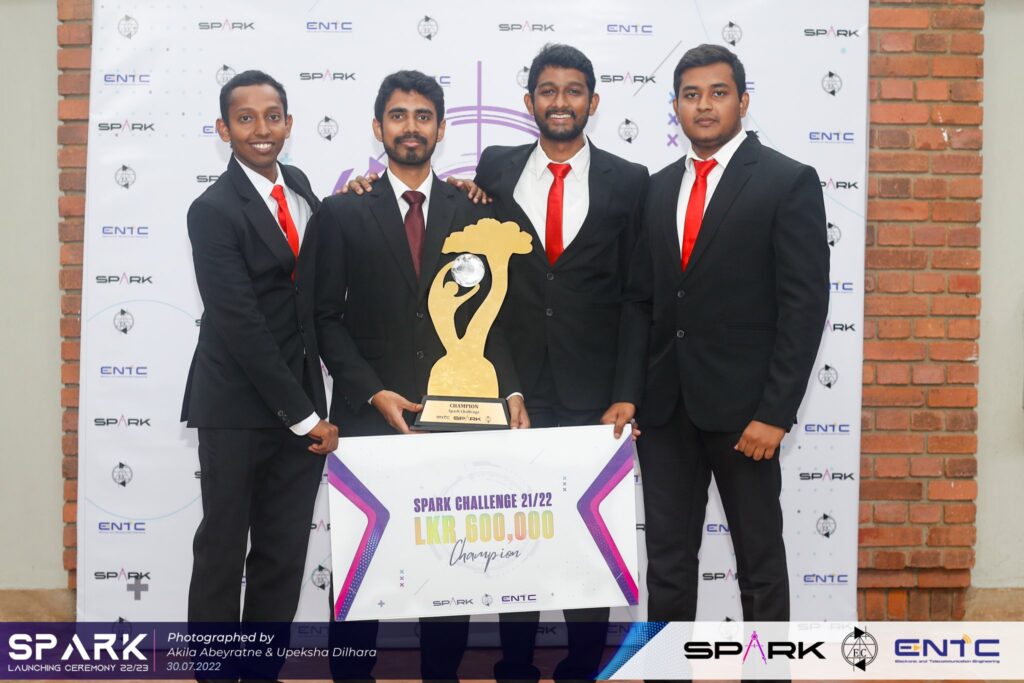
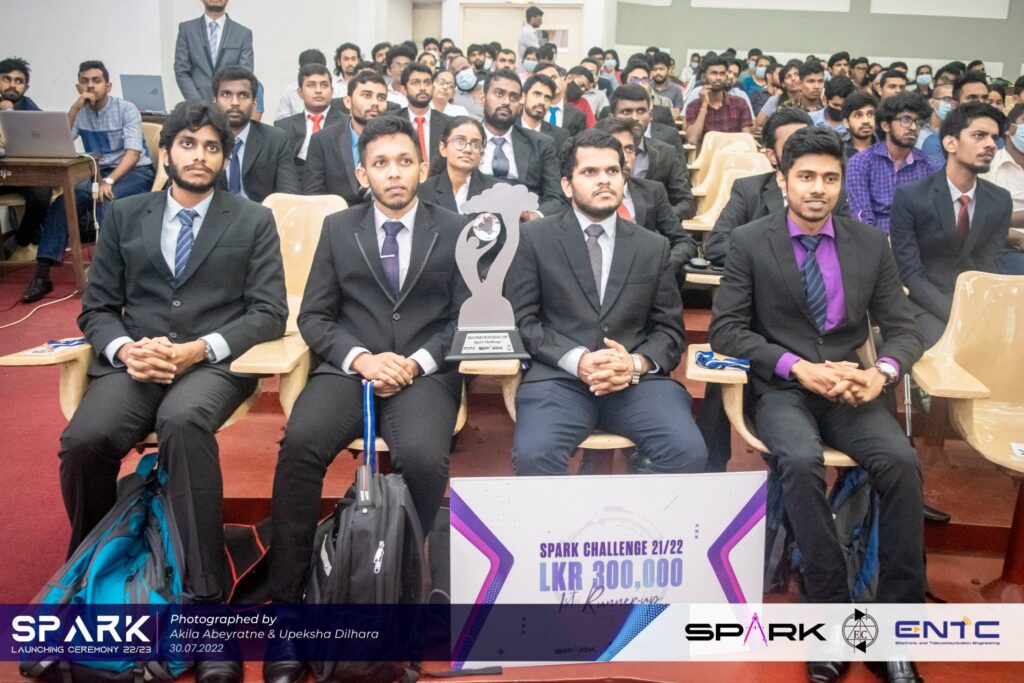
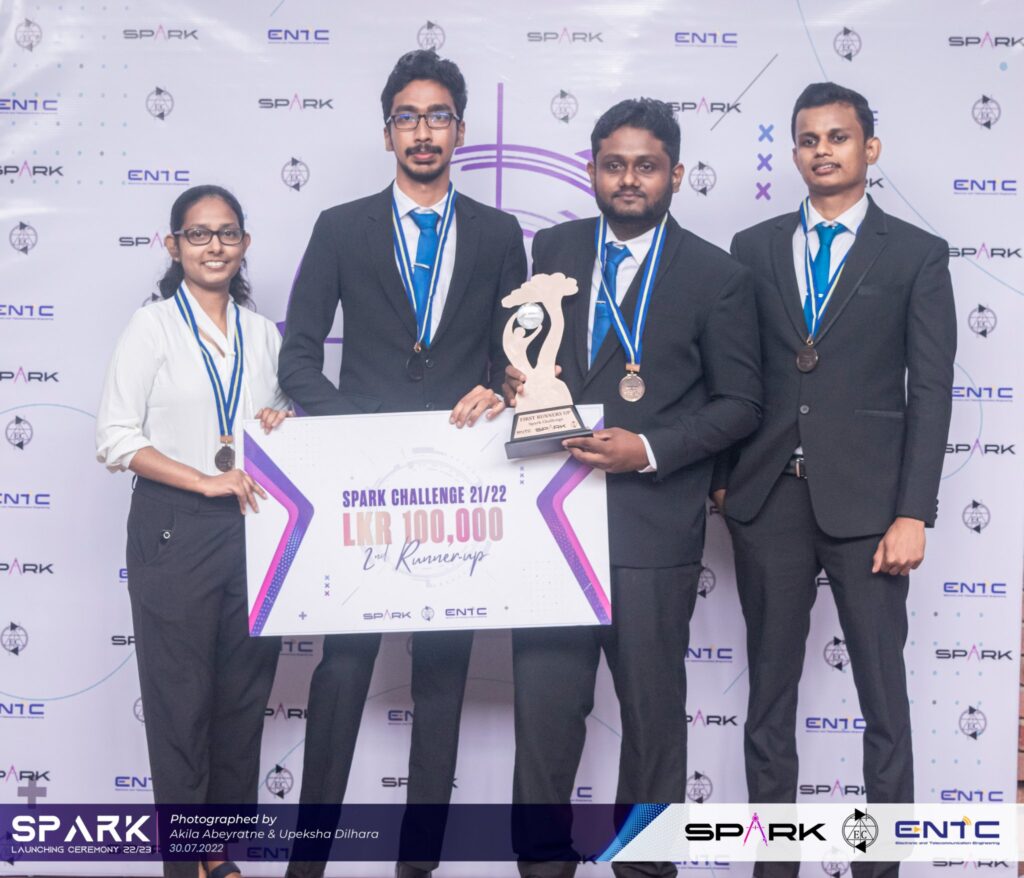
SPARK Pitching Sessions
SPARK project aims to drive projects that solve crucial problems that mankind faces such as climate change, food scarcity, and inequality in education though the application of engineering principles. All these are important aspects of the 17 Sustainable Development Goals (https://sdgs.un.org/goals). Approximately 35 student teams worked on developing solutions to problems that address one or more such goals. Ten groups were able to propose fully-developed ideas and make prototypes. This was possible after a long-term training provided by SAPRK with the involvement of foreign trainers.
As the culmination of this year-long process, the ten groups pitched their projects to an eminent panel of judges comprising Mr. Heminda Jayaweera, Mr. Fayaz Hudah, Mr. Chalinda Abeykon and Mr. Josh Robsen. This pitching session took place on July 24, 2022 at the Department of Electronic and Telecommunication Engineering in a vibrant setting with many students and staff members watching and deliberating about the possible impact of the projects.
Read MoreTeam AP116 wins Silver Award in the Grand Finals of InnovateFPGA Design Contest 2021/22
Team AP116, representing Pahan Mendis, Chathuni Wijegunawardana and Pamuditha Somarathne from the Department of Electronics and Telecommunication Engineering, has won the Gold Award in the Asia Pacific and Japan(APJ) region and the Silver Award from the whole world in InnovateFPGA Design Contest 2021/22. The team was guided by Dr. Ajith Pasqual as a faculty advisor and Mr. Abarajithan Gnaneswaran and Mr. Kithmin Wickramasinghe. This is the first time that a team from Sri Lanka has received one of top three prizes in this competition.
The InnovateFPGA Design Contest is a global competition based on Intel FPGAs, which is organized by Terasic Inc. with the collaboration of Intel Cooperation, Analog Devices, Microsoft as diamond sponsors and Digi-key, Mouser Electronics, Arrow Electronics and Macnica as gold sponsors. The theme for this year’s competition was ‘Connecting the edge for a sustainable future’. The teams were encouraged to utilize Intel FPGA Cloud Connectivity Kit, Microsoft Azure IoT and Analog Devices Plug-in boards in their projects.
To address these objectives, our team brought forth a concept of the Green Machine, a smart, user-friendly, domestic mini-greenhouse system to enable users to grow and efficiently monitor and tend to plants with much ease. This is suitable for domestic users to grow their own food in their homes. Also, due its modular design, the farmers can combine multiple units of Green Machines for cultivation in small to large scale farms. The condition within the Green Machine is monitored using a set of sensors and cameras and the sensor and image data is sent to the Terasic DE-10 Nano, a development kit based on Intel CycloneV SoC FPGA, for processing. After the processing, the sensor and image data are transferred to a Cosmos Database System on Microsoft Azure to be analyzed for further optimizations. Our team initially submitted their proposal back in October and got selected to the regional semi-finals along with 74 other teams in the APJ region. Then, they received the Intel Cloud Connectivity Kit with Terasic DE10 Nano Development board and 3 plug-in boards from Analog Devices to develop their project. They submitted a detailed design paper and a demo video in April and got selected to the regional finals. They went through a virtual QnA session with judges from Terasic, Intel, Microsoft and Analog Devices during the regional finals and emerged as the Gold Award Winners in the APJ region. With that, they were invited to the Grand Finals at the Intel Innovation Campus in San Jose, California, USA with 10 other teams around the world. Unfortunately, due to the rising covid cases in California, the Grand Finals later shifted into a virtual format. Nevertheless, our team presented their project with several improvements, to the Grand Finals in June and received much appreciation for its sustainability impact and the project presentation. The event was judged by experts from Terasic, Intel, Microsoft, Analog Devices and Digi-key.
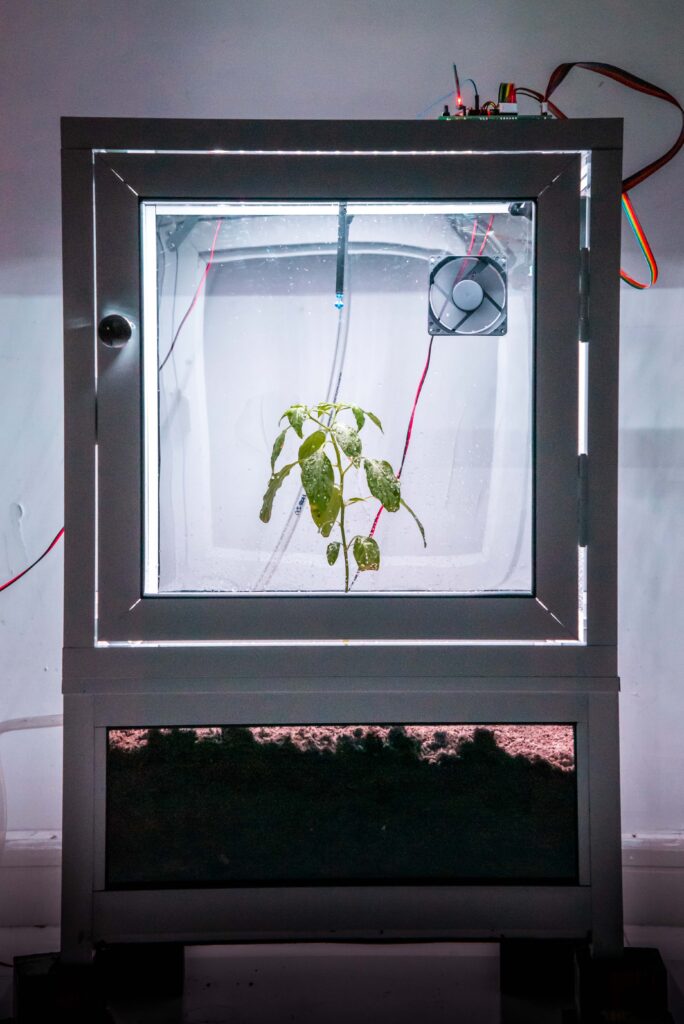
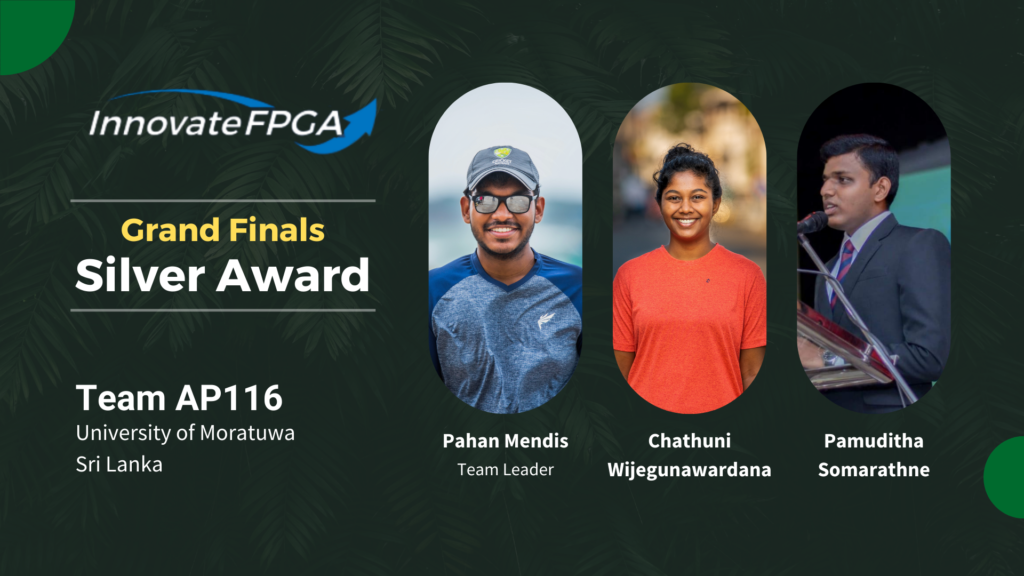
Migara Ratnatunga Trust Award for Industrial Training for Undergraduates 2020/2021
Kalana Abeywardena, an immediate graduate of Department of Electronic and Telecommunication Engineering, University of Moratuwa, won the Migara Ratnatunga Trust Award (All island 1st place – Category A) for the year 2020/2021 which was awarded by the Institution of Engineers, Sri Lanka (IESL) for the best Electronic and Telecommunication Engineering trainee who portrayed excellent performance at Industrial Training. The award (a cash prize and certificate) was presented at the IESL induction and graduation ceremony on Friday, June 17, 2022.
Kalana completed his 6 months industrial training at the School of Computer Science of the University of Sydney, Australia as a Visiting Research Student under the supervision of Dr. Suranga Seneviratne in 2019. During the training, he was mainly engaged in two projects: he developed a cyber security framework to address phishing attacks on websites using computer vision and artificial intelligence and worked on depth filters and artificial intelligence to process Light Field signals to improve their signal power. Moreover, he worked as an undergraduate assistant in a summer program organized by the University of Sydney for international students from China.
Migara Ratnatunga Trust Award is awarded to the high achievers of level 3 industrial training module at the Annual sessions of IESL. The results of the evaluations done by the university training division will be submitted to the IESL, where a few undergraduates would be recognized as high achievers in the compulsory industrial training module in the engineering undergraduate program after a rigorous evaluation among the undergraduates of other state universities.
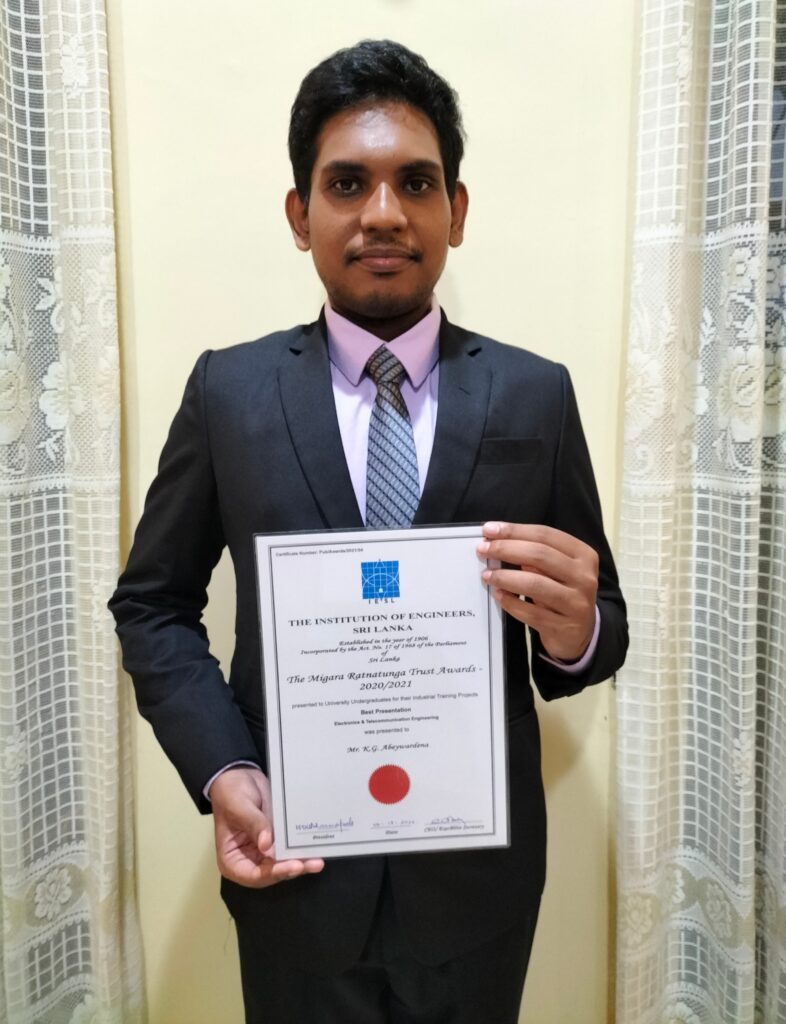
Multi-Label Reduced-Lead EEG Classification Using CNNs
Nima Wickramasinghe from the Department of Electronic and Telecommunication Engineering (ENTC), together with his mentor Mohamed Athif from the Department of Biomedical Engineering, Boston University (previously an undergraduate at ENTC) have written a research paper, titled “Multi-label Classification of Reduced-lead ECGs using an Interpretable Deep Convolutional Neural Network” which has been accepted to be published in the journal Physiological Measurement as a special issue paper.
In their work, they propose a novel method to identify the presence of 26 cardiac abnormalities in an ECG recording with reduced leads. Even though most of the previous work relies on 12-lead ECGs, classification using reduced leads remained unexplored. In their research, they trained a deep convolutional neural network to classify the ECG recordings and showed that the reduced-lead model performs comparably to the 12-lead model. In addition to accurately classifying the cardiac abnormalities, they have used SHAP (shapley additive explanations: a game-theoretic approach used to explain the output of any machine learning model) to interpret the deep learning model. The authors identified that the model learns almost the same diagnostic criteria used by cardiologists to classify cardiac abnormalities. By analyzing the model through SHAP, they were able to detect why the model underperforms in some of the classes, which was mainly due to the lack of discriminating features in reduced leads, labeling inconsistencies in the dataset, and low number of samples.
Physiological Measurement is a journal that covers the quantitative measurement and visualization of physiological structure and function in clinical research and practice, with an emphasis on the development of new methods of measurement and their validation. The Sustainable Education Foundation facilitated the collaboration between the 2 authors.
DOI Link to the paper: https://doi.org/10.1088/1361-6579/ac73d5
Read MoreMr. Pasan Dissanayake and Dr. Prathapasinghe Dharmawansa of ENTC have Published Two Research Papers in the Prestigious Journal IEEE Transactions on Information Theory
Two research papers written by Mr. Pasan Dissanayake and Dr. Prathapasinghe Dharmawansa of ENTC have been published in the prestigious journal IEEE Transactions on Information Theory. IEEE Transactions on Information Theory is the world’s No. 1 journal in the areas of Information and Communication theory research. This truly exceptional achievement will make the research history of ENTC. This extraordinary academic achievement will be a guiding spirit for the current and future researchers in the entire university system of Sri Lanka. Moreover, it will help place ENTC among the top researchers in information and communication theory in the world. The details of the two papers are as follows.
1. Distribution of the Scaled Condition Number of Single-spiked Complex Wishart Matrices
This paper statistically characterizes the scaled condition number (SCN) of single-spiked complex Wishart matrices by deriving its density function. The statistical characteristics of the SCN and its variants have been instrumental in understanding many physical phenomena across a heterogeneous field of sciences. While numerical analysts and statistical physicists are interested in the behavior of the SCN for white Wishart matrices, the case corresponding to correlated Wishart matrices are of paramount importance in wireless communications and statistics. In particular, the SCN has been used as a performance metric in certain wireless signal processing applications involving multiple-input multiple-output (MIMO) systems, in which the antenna correlation gives rise to the correlated Wishart matrix. Recently, the SCN has been proposed as one of the test statistics for blind spectrum sensing in cognitive radio (CR) systems. The key concept behind CR is to opportunistically utilize the underutilized spectrum in view of improving the spectral efficiency of modern wireless networks. Against this backdrop, this paper leverages powerful random matrix theoretic techniques and the novel density of the SCN to statistically characterize the receiver operating characteristics (i.e., ROC) of the aforementioned detector. Since the modern wireless architectures facilitate the use of large antenna/sensor arrays with comparable observational sample acquisition, the analysis has been extended to the asymptotic regime in which the number of antennas of the detector and the samples diverge at the same rate so that their ratio remains constant. It turns out that, in this asymptotic regime, the statistical power of the SCN based detector can be approximated by the most celebrated Tracy-Widom distribution corresponding to the complex matrices. Moreover, numerical results have revealed that those asymptotic results compare favourably with their not so large dimensional counterparts.
2. The Eigenvectors of Single-spiked Complex Wishart Matrices: Finite and Asymptotic Analyses
This paper investigates the finite dimensional distributions of the eigenvectors corresponding to the extreme eigenvalues (i.e., the minimum and the maximum) of single-spiked complex Wishart matrices. These spikes arise in various practical settings in different scientific disciplines. For instance, they correspond to the first few dominant factors in factor models arising in financial economics, the number of clusters in gene expression data, and the number of signals in detection and estimation theory. In particular, the focus is on the distributions of the squared modulus of the eigen-projectors (i.e., projection of the spiked-vector onto the leading and least eigenvectors) of single-spiked Wishart matrices. This metric is commonly used to infer information about the latent spiked-vector using the eigenvectors of the sample covariance matrix. A concrete example in this respect is the principal component analysis (PCA) in which the eigenvectors of the unknown population covariance matrix is approximated by the eigenvectors of the sample covariance matrix. This metric has further been used in the covariance estimation based on the optimal shrinkage of the eigenvalues of the sample covariance matrix in the high dimensional setting when the unobserved population covariance matrix assumes the spiked structure. This paper leverages the powerful contour integral representation of unitary integrals and orthogonal polynomial techniques to derive closed-form expressions for the densities of the above metrics. A somewhat surprising stochastic convergence result pertaining to the above metrics has also been established. Finally, the same analytical framework has been extended to derive the corresponding destines for real and singular Wishart scenarios; however, with closed-form solutions limited to a few special configurations only.
Team University of Moratuwa Selected as Finalists in the IEEE International Future Energy Challenge 2022
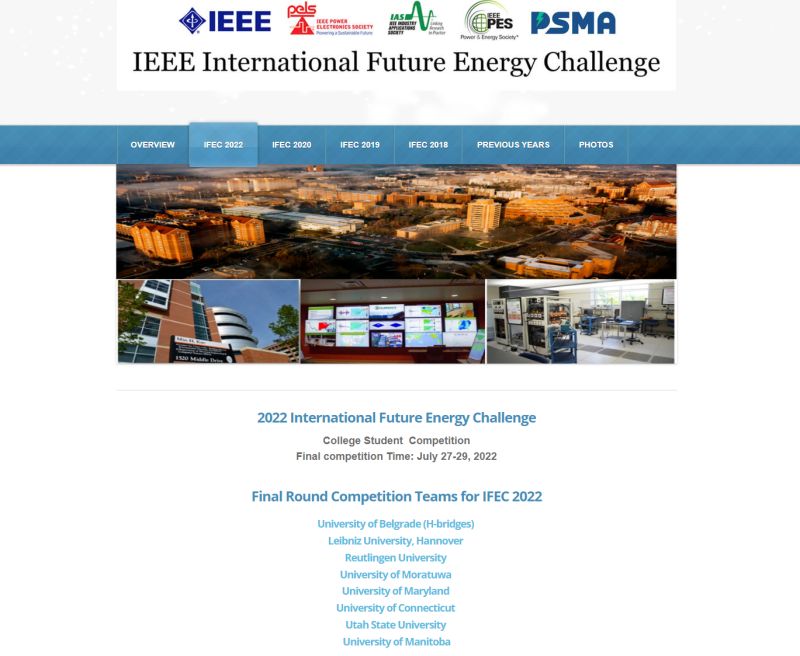
A team of undergraduates from the Dept. of Electronic and Telecommunication Engineering and Dept. of Electrical Engineering at the University of Moratuwa has been selected for the Grand Finals of the IEEE International Future Energy Challenge 2022 for the first time in Sri Lanka. This is a prestigious power electronics competition organized by the Institute of Electrical and Electronics Engineers (IEEE) and sponsored by the IEEE Power Electronics Society, IEEE Industry Application Society, IEEE Power and Energy Society and Power Source Manufacturers’ Association.
The team advisors:
Prof. Udayanga Hemapala – Head Department of Electrical Engineering
Dr. Subdoha Charles – Senior Lecturer at the Department of Electronic and Telecommunication Engineering
Mr. Thilina Ambagahawaththa – Lecturer at the Department of Electronic and Telecommunication Engineering
Mr. Iresh Jayawardana – Graduate of the Department of Electronic and Telecommunication Engineering
The team members from the Department of Electronic and Telecommunication Engineering:
Pahan Mendis – Team Leader
Pamuditha Somarathne
Punsara Mahawela
Ransara Wijitharathna
Dineth Mudalige
Chathuni Wijegunawardana
Hiruni Wijewardena
Nikeshi Kumarasinghe
Limalka Sadith
Supun Kuruppu
Biyon Fernando
The team members from the Department of Electrical Engineering:
Nawanjana Yesith
Geshan Sudasinghe
For this competition, the team designed a smart efficient and light microgrid inverter that converts DC power from a solar panel into AC. Since 2010, solar costs have declined 70% to 80% in the world, making solar one of the most economical ways for energy generation. However, integrating renewable and distributed energy resources, such as photovoltaics (PV) and energy storage devices, into the electrical applications requires advanced power electronics, or smart inverters, that provide efficient and reliable power management. The team target to achieve an efficiency greater than 95% and a bulk manufacturing cost less than $200 in their inverter.
The team progressed through the initial selection round where they submitted their proposal for the inverter that caters the set of given specifications. During the semi-final round, 13 teams from prestigious universities in the world demonstrated their hardware design of the proposed inverter. Our team from University of Moratuwa, along with 7 other teams from Europe, Canada, and America, have been selected for the grand finals based on the technical quality of the design and the progress of hardware implementation demonstrated in the semi-final round. The final competition will be held between 27th-29th of July 2022 at University of Tennessee, Knoxville, USA.
The complete hardware prototype of the inverter will be tested for its performance in front of judges and industry experts at the grand finals. A group of students representing the Team UoM is planning to visit the USA with the designed inverter for this final competition.
Read More
